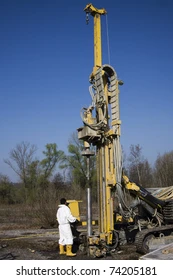Ph.D. in Civil Engineering – Geotechnical Engineering Specialization: Introduction, Admission, Registration, Eligibility, Duration, Fees, Syllabus 2024

Introduction:
A Ph.D. in Civil Engineering with a specialization in Geotechnical Engineering is designed for those who aspire to advance their expertise in the analysis, design, and construction of foundations, slopes, retaining structures, and other systems that are influenced by ground conditions. This degree equips students to tackle complex problems in geotechnical engineering with innovative research and sophisticated problem-solving techniques.
Admission Process:
Entering this advanced program involves several key steps:
- Application Submission: Applicants must submit a comprehensive application, including a resume, transcripts, a statement of purpose, and a detailed research proposal.
- Prerequisites: A master's degree in civil engineering or a closely related field is typically required. Exceptionally motivated candidates with a bachelor’s degree and substantial research or professional experience in civil engineering may also be considered.
- Letters of Recommendation: Three letters from academic or professional references that attest to the candidate's academic abilities and potential for research in geotechnical engineering.
- Interviews: Personal or video interviews with faculty members to discuss the applicant's research interests and alignment with the program's focus areas.
- GRE Scores: Many programs require GRE scores, particularly focusing on quantitative and analytical writing skills.
Eligibility:
Candidates should typically meet the following criteria:
- Advanced Technical Knowledge: Strong foundation in the fundamentals of civil engineering, especially in soil mechanics and material properties.
- Research Experience: Demonstrable experience in research, particularly in geotechnical engineering or related fields.
- Analytical Skills: High proficiency in mathematical and computational modeling techniques used in geotechnical analysis.
- Problem-solving Abilities: Capability to develop innovative solutions to complex engineering challenges.
- Communication Skills: Excellent written and oral communication skills for effective dissemination of research findings.
- Collaborative Spirit: Ability to work effectively in interdisciplinary research teams.
Completion Time:
The program typically requires 4-6 years to complete, depending on the research topic, dissertation complexity, and the student's pace.
Career Opportunities:
Graduates have diverse career prospects in:
- Academia: Teaching and conducting research at universities.
- Engineering Consulting Firms: Designing and supervising the construction of geotechnical projects.
- Government Agencies: Overseeing infrastructure projects and regulatory compliance.
- Research Institutions: Leading innovative research projects in geotechnical engineering.
- Construction Management: Managing large-scale construction projects that involve significant geotechnical challenges.
- Private Sector: Developing new technologies and solutions for geotechnical applications.
Syllabus:
Key subjects often include:
- Advanced Soil Mechanics
- Rock Mechanics
- Geotechnical Earthquake Engineering
- Environmental Geotechnics
- Foundation Engineering
- Numerical Methods in Geotechnical Engineering
Internship Opportunities:
Internships are critical for gaining practical experience:
- Construction Sites: Hands-on experience in managing geotechnical aspects of construction projects.
- Engineering Firms: Applying theoretical knowledge to real-world challenges in a professional setting.
- Research Labs: Working on cutting-edge research projects in collaboration with senior engineers and researchers.
- Government Projects: Participating in public infrastructure projects that require geotechnical expertise.
Scholarships and Grants:
Various funding options are available:
- University Scholarships: Typically cover tuition and provide a stipend.
- Research Grants: Funding for specific research projects or dissertation work.
- Professional Societies: Many professional societies offer grants and awards for geotechnical research.
- Private Foundations: Support for research projects that align with the foundation’s goals.
- International Scholarships: For students from abroad or projects that involve international collaboration.
FAQs:
What distinguishes a Ph.D. in Geotechnical Engineering?
It focuses on deep technical and research skills in understanding and improving the interactions between earth materials and human-constructed facilities.
What are the prerequisites for success in this program?
Strong background in engineering principles, especially soil and rock mechanics, and a keen interest in practical and research challenges in geotechnical engineering.
What kind of research topics are common in this field?
Topics often include sustainability in construction practices, risk assessment in geotechnical engineering, and innovative materials for soil stabilization.
Are there opportunities for field research?
Yes, many programs encourage or require field research as part of the dissertation process to apply theoretical knowledge practically.
